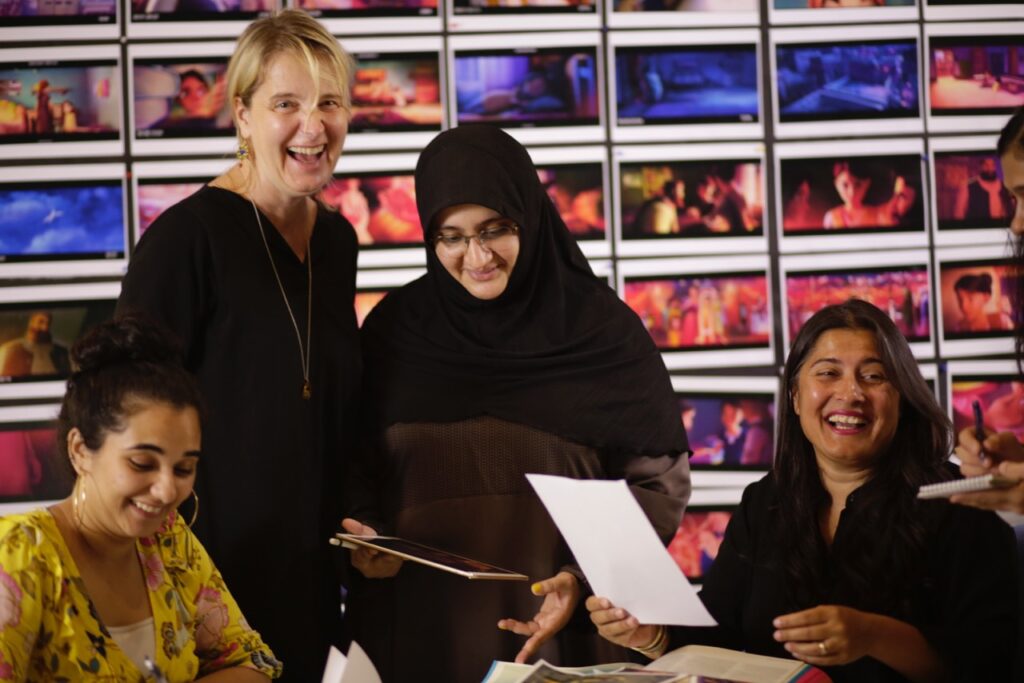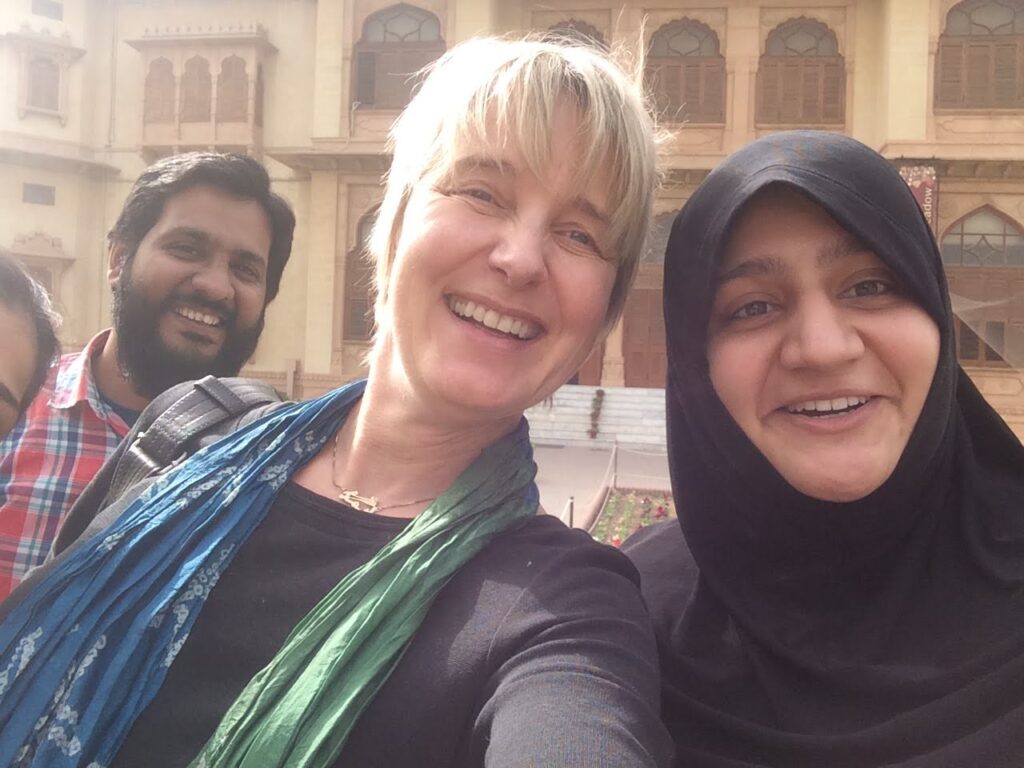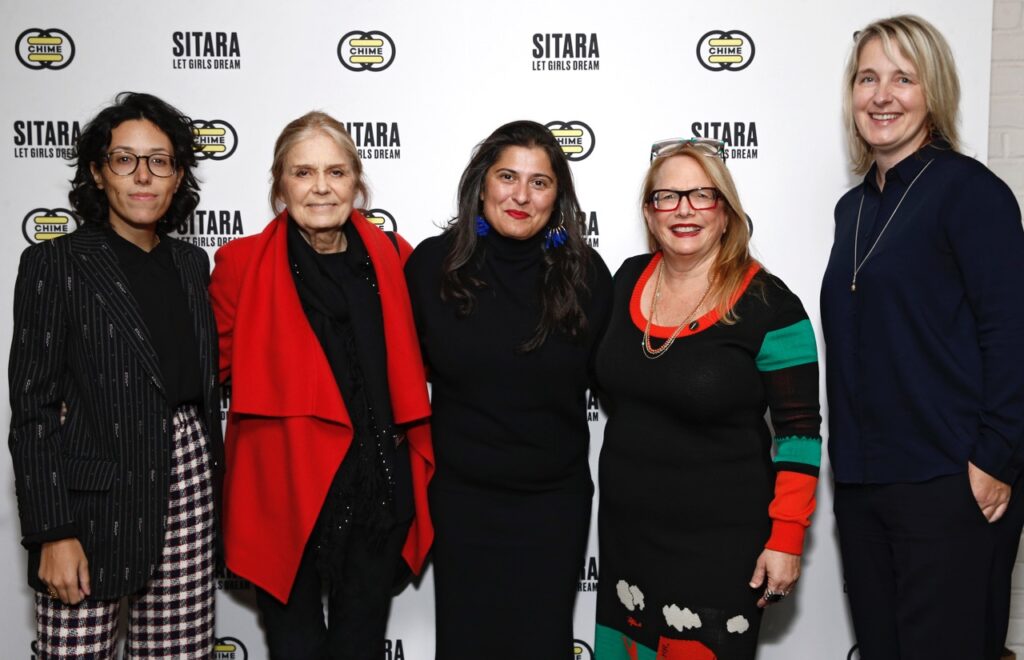WIA SPOTLIGHT STORIES
SPOTLIGHT STORIES: IMKE FEHRMANN
Interview conducted by Tracey Miller-Zarneke
Women in Animation is pleased to feature producer Imke Fehrmann whose involvement in the short animated film “SITARA: Let Girls Dream” truly embodies the hallmarks of advocacy so strongly valued by WIA: a supportive network, generous mentorship, international collaboration and celebration of opportunities for women have all come together in her work to inspire change on a personal, cultural and global level.
What, if any, adversities have you faced in your career or life in general, and how did they shape the filmmaker you are today?
As a child, I loved stories. My parents encouraged all of us to read a lot, and my older sisters used me as guinea pig student to play “school.” I was able to read and write when I was 4, and my first book was called “My Little Horse Poly.” Although I never managed to write another masterpiece like that, stories have always been a big part of my life.
When I was 16, I was diagnosed with epilepsy and at that time, the recommendations of the doctors were very restrictive – from no coffee (!) and no sports to no long-distance traveling. I was an adventurous and active teenager, and this was quite a cut in my life. Although I soon became seizure-free and am now for over 20 years, it took years to find my courage, my limits and reconnect with myself. It was the famous feminist journalist Alice Schwarzer who was one of the first to encourage me to embrace myself for who I am and told me that I am the person I am because of my path and my challenges, not despite of them. It was an important moment for me, and the first experience of the support of a network of women.
The process helped me to never consider anything impossible until I have at least tried, to not take rules and limitations for granted, and to see and grab opportunities when they arise (and when my instinct and heart say yes.) It also made me very curious to learn about stories and people’s journeys.
In Animation, I started by coincidence: I only had a vague idea of telling stories, images, and business in my mind, from journalism to TV. But once I started to work in Animation in 1990, I fell in love with the art form and the people who create it. And this is where I encountered another adversity that I am now incredibly grateful for: almost 20 years ago, there was no industry for international animated films in Germany. When I decided in the very early 2000s that I wanted to work with excellent professionals worldwide, I wanted to learn from the best, so to work on big international movies that reach a wide audience, I had no other option than moving abroad. That was a big challenge yet also the most wonderful beginning of a new part of my career.
I moved to the UK in 2003, and from there to Australia, Singapore and Canada. My career gave me the opportunity to work not only with some of the best talent in the industry, but also to live and work in different cultures and countries. The diversity and richness of stories has greatly impacted me as a person and as a Producer.
Who were/are your mentors, inside or outside of animation? How have they affected you?
The biggest influence on my curiosity for cultures and diversity were my parents. They loved travelling and not only did they manage to take us to many different countries despite a limited budget, they also motivated us to always learn at least a minimum amount of words and sentences in the foreign language; they sent us shopping, encouraged us to talk to locals and experience the various cultures beyond hotels and touristic paths.
When I then started my career in Germany, I was completely unaware of the concept of mentorship, and while my wonderful network of colleagues and friends helped me to be where I am today, I would not say I had a mentor. However, the many people on my path that were striving for excellence paired with empathy and respect were role models to me during my career. I am extremely lucky that I was able to work with such a big variety of artists. I also really appreciate that the very experienced professionals in the big studios were incredibly open to sharing knowledge and advice.
The people on my path have shaped me as a producer and have also instilled in me a sense of responsibility for others in our global industry. That is why it is so important to me to serve as a mentor and offer that opportunity to other young women who may not have the opportunity or the exposure. And the mentorship program of WIA is a wonderful opportunity for anyone – I really appreciate the approach and the work of the WIA mentorship team.
Have you ever served as a mentor? If so, please describe that experience.
I joined the mentorship program of WIA as mentor in 2019. Mentoring also makes me a better manager and producer, as I learn a lot: to listen better, and to find better solutions. Most of all, mentoring is tremendously inspiring.
Going back in time and when I first started working abroad, professional development of my teams was very important to me. Listening to dreams and visions, working out goals, and helping people to reach the next level is something that makes me happy at work. At first, I did not consider myself as a mentor and often learned of the impact only after people told me about their successes. Now, I look more open-eyed at where I can create change and a positive impact.
In 2016, I reached out to Sharmeen Obaid-Chinoy after I learned that she already had started animation in Pakistan, and even produced a first animated feature film. Her vision really inspired me, and I sent Sharmeen an email and offered to help or mentor her production if she ever needed it. She responded the next day, and 2 weeks later, we met for coffee, and after 30 minutes we decided, “Let’s do this.”
Shortly after, I started with weekly calls with the team from Montreal to Karachi and soon realized that it is very challenging to mentor someone from a distance if you have so little insight in culture, communication, and team dynamics. I decided spending time with the team and getting to know them was integral for their success. With the support of the German organization, SES Senior Expert Service, I travelled to Pakistan in January 2017. It was an interesting time in the world, and there I was in an allegedly dangerous country, experiencing openness, collaboration, and a friendly welcome.
Soon I realized that the team had so many questions that needed in-depth knowledge, very detailed and also technical topics including pipeline, workflow and tools that I knew I would have not been able to answer. Therefore, I reached out to many people in the industry with different specializations in all the different countries I had been, and asked them to spend just an hour or two on Skype answering questions. All of them agreed, and this was definitely one of my happiest moments: when I saw them spending their free time mentoring and helping a team in Pakistan without anything in return. Their advice and mentoring, together with the commitment and perseverance of the team in Pakistan, has helped successfully complete the short film SITARA.
The studio and production team that created “SITARA: Let Girls Dream” has an incredibly inspiring mix of persons, yourself included. Please tell us how this amazing collaboration came together.
SITARA is a film made in Pakistan by talented and committed artists, and it was made possible with the support of a strong global network. For me, it is also a success story of global mentorship and how the international community can support artists and filmmakers to tell stories that matter and have them heard globally.
One day in 2018, Sharmeen called me to tell me about the idea. I loved the idea and the vision behind it and we soon started script and design with the co-producer Eleyna and the team; we were working remotely together. In the last two months of production, I went to Karachi to help finishing the film.
My passion is bringing people together and helping them to create their stories. Paired with Sharmeen’s incredible energy and our combined networks, we received fantastic global support, and we are very grateful for that.
Sharmeen brought Vice Studios with Ariel Wengroff and Gloria Steinem to the table, and we are very grateful that they entered this adventure with us and were very supportive all the way.
Sharmeen met Darla Anderson in 2012 at a dinner after she won her first Oscar® for “Saving Face” and reconnected with her at the beginning of SITARA. Darla has been such a wonderful EP and mentor in story-telling, and also helped us to connect with other key people. During the TED conference in April, via a network of engaged and supportive women, Sharmeen also connected to Laura Karpman. Laura is the audible soul of the movie. She has composed our wonderful soundtrack and also connected us to Audio Network who then helped us with our full orchestral recording that took place at Abbey Road Studio.
In Karachi, the team was outstanding and incredibly committed and determined. Animation Director Kamran Khan, Art Director Syed Salman Nasir, and CG Supervisor Adnan Saeed were creatively and technically pushing themselves and the team beyond what we dreamed was possible, while also creating a healthy studio and work environment of quality, equality, and good communication. Eleyna Sara-Haroun, Co-Producer, and Syed Ayub, Associate Producer, were the backbone of Production Management who did an awesome job of holding everything together.
Eleyna started working for Sharmeen as an intern in 2011, and mentored by Sharmeen, worked on different roles on documentary films. When I came to Karachi in 2017, Eleyna told me (when we were drinking tea sitting on a secret place on a roof in Karachi) that she loved animation and already had written her own stories. We were just looking for someone who wanted to manage the animation team, and so Eleyna’s story became another example of how mentorship and support can help women to shine in their careers. Sharmeen asked her to work in the animation division. She helped produce several short pieces and helped Sharmeen craft the story of SITARA, then came on as a co-producer managing the team, helping to film acting references and working closely with the CG Supervisor to help the team build a pipeline to better support the filmmaking process.
Eleyna became a member of WIA at the end of SITARA, together with the Environment Design Lead of the film Maha Abdul Alaam – the first two WIA members in Pakistan. I hope that they will both eventually create and tell their own stories.
The international mentors of the team were incredibly helpful and gave invaluable feedback and support to the team, from Sydney, London, Berlin, Montreal, Los Angeles, San Francisco, Shanghai, Singapore, and Bangkok. A huge THANK YOU to all who have supported the team!
What is the main message of “Sitara” that you hope to convey to audiences?
12 million girls each year do not have the opportunity to follow their dreams because they are married as child brides.
All of us who worked on the film have one simple hope: that girls around the world will be inspired to achieve their dreams.
We want to create a global dialogue for change so that girls worldwide will be empowered to realize their dreams.
If SITARA can play a role in creating change (which we are already seeing happen during and after screenings), it gives us all joy and hope for the future.
We dream of reaching girls and parents everywhere, so the campaign is an integral part of the work. Sharmeen and her network have started #LetGirlsDream (letgirlsdream.org) and we hope that “SITARA: Let Girls Dream” will grow from an animated film from Pakistan to a global movement. To make that happen, many amazing people are coming together: Susan Chokachi, CEO of Gucci, has supported Sharmeen Obaid-Chinoy’s work in the past, including her projects with women in Education in Pakistan. Rachel Decker works with Chime for Change and spearheads the campaign. Chime for Change and Gucci came on to support our outreach program, partnering with Picture Motion to take the film to schools across the US. Girls not Brides, funded by Mabel van Oranje, joined and supports us by taking the film to schools in Europe and Africa, and Sharmeen’s own outreach team in Karachi takes the film to schools across Pakistan. And Equality Now, headed by Yasmeen Hassan, also came on board to support us with outreach and education.
Why is an organization like Women in Animation important?
For so many reasons! We envision a world of equality and for that, we need a strong network, advocacy, mentoring and support. It is inspiring to see the impact: women’s projects, female leadership, creativity, mentorship are all more visible and the situation has certainly changed to the better in the past years. Beyond that, especially in the developing countries (in the sense of animation and VFX), women really need our support and I am excited that WIA is expanding globally. I have seen first-hand how inspiring the WIA work is to women living in challenging environments, and I am looking forward to help continuing this work.
What advice do you have for young people looking at animation or other artistic industries as their career field, anywhere in the world?
Animation is a wonderful art form to tell stories and express yourself. It has been my “home” for almost 30 years and the people and artists that I met enriched my work and my life. I would advise you to pursue your dream, learn as much as you can, strive to excel, and always keep being conscious about those in your community.
For those in developing countries, this is often a bigger challenge than for someone living in Europe, Canada or the US, and even more difficult for women. There are often not enough universities or film schools, there is rarely a big enough industry for viable work options and, in many cases, there are adversities from families and society to an artistic career, with additional challenges for women based on their traditional roles in many societies.
I think you can help yourself by networking with like-minded people in your country, doing online courses and joining online communities. Networking with the international community may sometimes be more challenging, but WIA offers great and globally growing opportunities. And last but not least for networking, a personal well-written email can open doors that you would have not expected to open.
Any other thoughts or advice you wish to share with our membership?
It is more of a wish than an advice: that members of WIA connect with women and female filmmakers in developing countries around the world and help to support them to follow their dreams and find their voice through animation art and film. And…maybe help WIA by sponsoring memberships for those who cannot afford it.
WIA wishes Imke further success in her work, and continued positive energy for the change inspired by SITARA.




